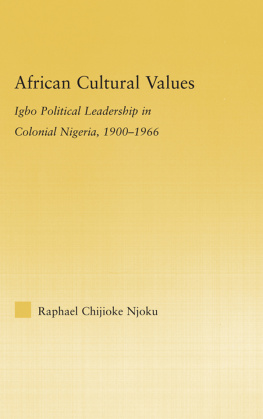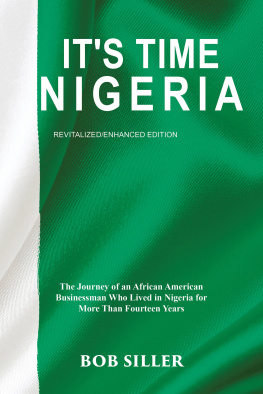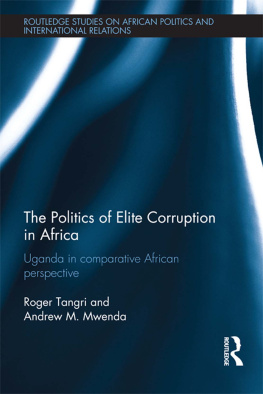Raphael Chijoke Njoku - African Cultural Values: Igbo Political Leadership in Colonial Nigeria, 1900–1996
Here you can read online Raphael Chijoke Njoku - African Cultural Values: Igbo Political Leadership in Colonial Nigeria, 1900–1996 full text of the book (entire story) in english for free. Download pdf and epub, get meaning, cover and reviews about this ebook. year: 2013, publisher: Routledge, genre: Politics. Description of the work, (preface) as well as reviews are available. Best literature library LitArk.com created for fans of good reading and offers a wide selection of genres:
Romance novel
Science fiction
Adventure
Detective
Science
History
Home and family
Prose
Art
Politics
Computer
Non-fiction
Religion
Business
Children
Humor
Choose a favorite category and find really read worthwhile books. Enjoy immersion in the world of imagination, feel the emotions of the characters or learn something new for yourself, make an fascinating discovery.
- Book:African Cultural Values: Igbo Political Leadership in Colonial Nigeria, 1900–1996
- Author:
- Publisher:Routledge
- Genre:
- Year:2013
- Rating:5 / 5
- Favourites:Add to favourites
- Your mark:
African Cultural Values: Igbo Political Leadership in Colonial Nigeria, 1900–1996: summary, description and annotation
We offer to read an annotation, description, summary or preface (depends on what the author of the book "African Cultural Values: Igbo Political Leadership in Colonial Nigeria, 1900–1996" wrote himself). If you haven't found the necessary information about the book — write in the comments, we will try to find it.
Although numerous studies have been made of the Western educated political elite of colonial Nigeria in particular, and of Africa in general, very few have approached the study from a perspective that analyzes the impacts of indigenous institutions on the lives, values, and ideas of these individuals. This book is about the diachronic impact of indigenous and Western agencies in the upbringing, socialization, and careers of the colonial Igbo political elite of southeastern Nigeria.
The thesis argues that the new elite manifests the continuity of traditions and culture and therefore their leadership values and the impact they brought on African society cannot be fully understood without looking closely at their lived experiences in those indigenous institutions where African life coheres. The key has been to explore this question at the level of biography, set in the context of a carefully reconstructed social history of the particular local communities surrounding the elite figures. It starts from an understanding of their family and village life, and moves forward striving to balance the familiar account of these individuals in public life, with an account of the ongoing influences from family, kinship, age grades, marriage and gender roles, secret societies, the church, local leaders and others.
The result is not only a model of a new approach to African elite history, but also an argument about how to understand these emergent leaders and their peers as individuals who shared with their fellow Africans a dynamic and complex set of values that evolved over the six decades of colonialism.
Raphael Chijoke Njoku: author's other books
Who wrote African Cultural Values: Igbo Political Leadership in Colonial Nigeria, 1900–1996? Find out the surname, the name of the author of the book and a list of all author's works by series.






